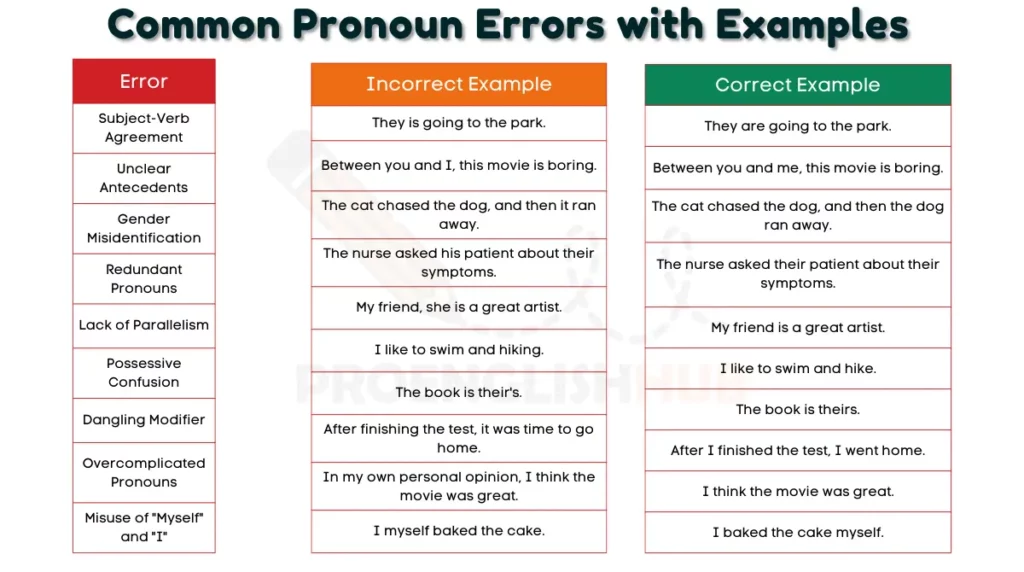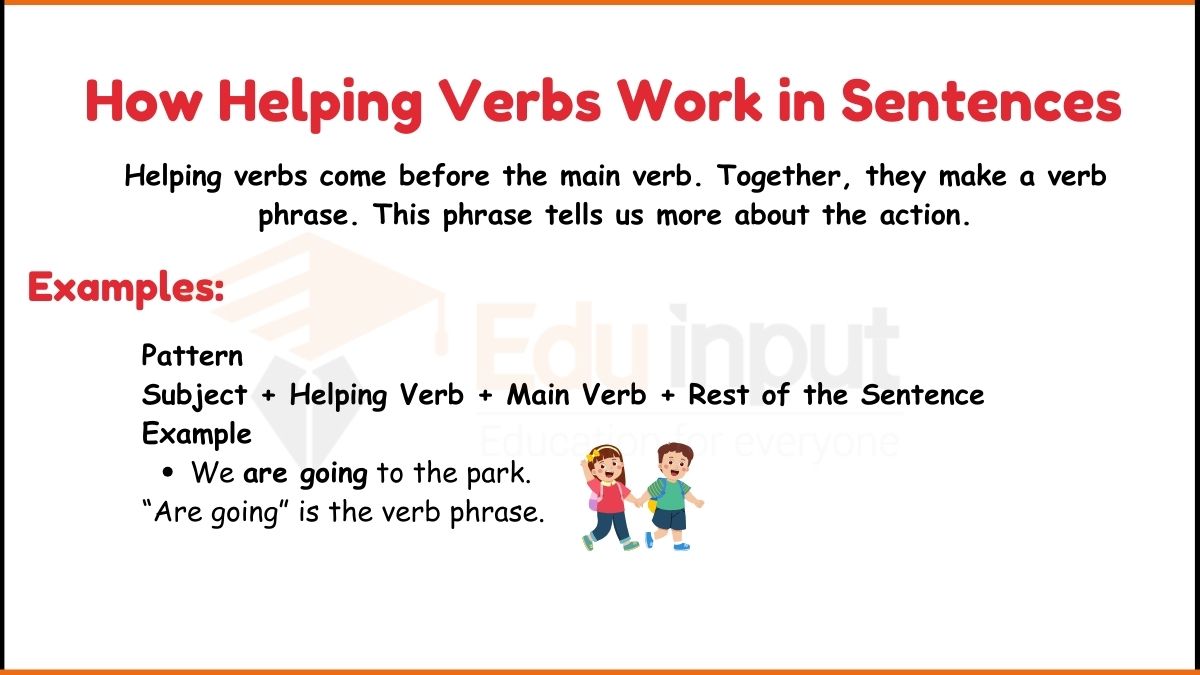Common pronoun errors include subject-verb agreement issues, pronoun case confusion, unclear antecedents, gender misidentification, redundant pronouns, lack of parallelism, possessive confusion, dangling modifiers, overcomplicated pronouns, and misuse of “myself” and “I.”
For example, subject-verb agreement errors involve mismatching the number of the subject and the verb, while pronoun case confusion arises from using the incorrect form of pronouns. Recognizing and correcting these errors is crucial for effective and precise writing.

Table of Contents
ToggleCommon Pronoun Errors
Here are most Common Pronoun Errors and their Examples:
1. Subject-Verb Agreement
Subject-verb agreement errors occur when there is a mismatch between the subject and the verb in a sentence. The verb must agree in number with the subject, whether it is singular or plural.
Examples 1
Incorrect: They is going to the park.
Correct: They are going to the park.
Examples 2
Incorrect: She don’t like pizza.
Correct: She doesn’t like pizza.
2. Pronoun Case Confusion
Pronoun Case Confusion arises when the incorrect form of a pronoun is used, especially in terms of subjective (I, he, she) and objective (me, him, her) cases.
Examples 1
Incorrect: Between you and I, this movie is boring.
Correct: Between you and me, this movie is boring.
Examples 2
Incorrect: The teacher gave we a lot of homework.
Correct: The teacher gave us a lot of homework.
3. Unclear Antecedents
Unclear Antecedents occur when it is unclear to which noun a pronoun is referring. This lack of clarity can lead to confusion in the meaning of the sentence.
Examples 1
Incorrect: The cat chased the dog, and then it ran away. (Unclear who ran away)
Correct: The cat chased the dog, and then the dog ran away.
Examples 2
Incorrect: My sister and her are always arguing. (Unclear who “her” refers to)
Correct: My sister and I are always arguing.
4. Gender Misidentification
Gender Misidentification errors happen when the gender of the pronoun does not match the gender of the noun it replaces, leading to confusion or inaccuracy.
Examples 1
Incorrect: The nurse asked his patient about their symptoms.
Correct: The nurse asked their patient about their symptoms.
Examples 2
Incorrect: The lawyer told his client to remain silent.
Correct: The lawyer told their client to remain silent.
5. Redundant Pronouns
Redundant Pronouns occur when unnecessary pronouns are used, leading to redundancy and awkward phrasing.
Examples 1
Incorrect: My friend, she is a great artist.
Correct: My friend is a great artist.
Examples 2
Incorrect: The book, it was very interesting.
Correct: The book was very interesting.
6. Lack of Parallelism
Lack of Parallelism errors happen when parallel structures are not maintained in a sentence, especially when using coordinating conjunctions.
Examples 1
Incorrect: I enjoy reading books but not watching movies.
Correct: I enjoy reading books but not watching movies.
Examples 2
Incorrect: I like to swim and hiking.
Correct: I like to swim and hike.
7. Possessive Confusion
Possessive Confusion occurs when there is confusion in forming possessive pronouns, leading to errors in indicating ownership.
Examples 1
Incorrect: The book is their’s.
Correct: The book is theirs.
Examples 2
Incorrect: The dog wagged its’ tail.
Correct: The dog wagged its tail.
8. Dangling Modifier
Dangling Modifier errors occur when the word or phrase a modifier is intended to describe is not clearly stated in the sentence.
Examples 1
Incorrect: After finishing the test, it was time to go home.
Correct: After I finished the test, I went home.
Examples 2
Incorrect: While walking in the park, it started to rain.
Correct: While I was walking in the park, it started to rain.
9. Overcomplicated Pronouns
Overcomplicated Pronoun errors involve using unnecessarily complex or verbose pronoun constructions, which can hinder clarity and conciseness.
Examples 1
Incorrect: In my own personal opinion, I think the movie was great.
Correct: I think the movie was great.
Examples 2
Incorrect: Just between you and me, I don’t like that restaurant.
Correct: I don’t like that restaurant.
10. Misuse of “Myself” and “I”
Misuse of “Myself” and “I” errors occur when these reflexive pronouns are incorrectly used in place of the objective or subjective pronouns.
Examples 1
Incorrect: I myself baked the cake.
Correct: I baked the cake myself.
Examples 2
Incorrect: I taught myself how to play guitar.
Correct: I taught myself how to play guitar.
Common Pronoun Errors Exercise
Fill in the blanks with the correct pronouns, and use the hints to guide you.
Remember to use gender-neutral pronouns like “they/them” when the gender of the person is unknown or unspecified.
- The dog wagged __________ [own/its] tail excitedly. (Wrong: his/her; Hint: The dog isn’t a specific human)
- Between you and _,____________ this secret is safe. (Wrong: I/me; Hint: Check the preposition)
- The chef proudly presented ________ [creation/them] to the hungry guests. (Wrong: his/her; Hint: The creation is non-human)
- After I finished the race, ____________ [it/then] was time to celebrate. (Wrong: he/she; Hint: Avoid dangling modifiers)
- Everyone enjoys spending time with ____________ [families/themselves]. (Wrong: their; Hint: Consider who enjoys spending time)
- The teacher asked each student to share ____________ [own/their] thoughts on the poem. (Wrong: his/her; Hint: Each student has multiple thoughts)
- Who did you give the flowers ______________ [to/for]? (Wrong: at/by; Hint: Check the preposition)
- I taught _____________ [me/myself] how to code, and now I can’t stop building websites! (Wrong: I; Hint: Identify the object of the verb)
- The book on the shelf is ___________ [mine/my]. (Wrong: me; Hint: Consider ownership)
- In _____________ [my opinion/my own personal opinion], this song is a masterpiece. (Wrong: I; Hint: Avoid redundancy)



